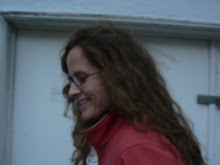If his first book The Man Suit sits on the borders of tender absurdity, Zachary Schomburg's newest book, Scary, No Scary, hovers on the borders of absurd and tender yet existential. The Man Suit explores costume and disguise, even going so far as to limit all man and woman names to Carlos and Marlene. (Both of which are so manly and so womanly; Marlene being particularly old timey). The poems pose a weird sort of ontology, discovering why things are the way they are and how things happen as reactions to other actions. Schomburg's, Scary, No Scary investigates smallness. Abnormally or obtrusively gigantic things dwarf small things that appear throughout the book--spiders (being stuck in between spaces like a wolf spider), hummingbirds, and eyelashes (piles of). There is also quite a bit of attention given to sex parts... pointing at them... wrapping fake intestines around them... and the sex that happens with those sex parts always takes place as a kind of reward. The sex seems to surprise, seems to happen in unforeseen places. I couldn't help but note the continuous references to babies and children, even a "pretend son," for that matter, and their nod toward thinking of oneself as adultish, as someone capable of taking care of someone else, someone with advice to give.
The poem, "The Black Hole," is a perfect example of how Zachary Schomburg's poems are composed of absurd, sort of silly action, at the heart of which sits painful tenderness and incredibly poignant language. Have a listen to "The Black Hole" here:
The poem's movement is so staggeringly precise yet informal. Feeling "as if our hearts had been switched" delicately and quickly moves into the moment after, an end-of-times scenario in which we pass each other with each other's hearts. This delicate balance happens moment to moment, at the start, recognizing that one would push someone else into the back hole, that one wants to jump into it oneself, wants to investigate mortality or something unknown.
I actually prefer this poem in its poem-film form, which Schomburg arranged himself. It's an incredible experience to read the words as they are given slowly on the screen (along with images and sound). It breaks up the boxiness of the prose poem as well as slows it down to it's inherent humorous heart break. You can watch "The Black Hole" as well as some of his other films here or watch it with me here:




No comments:
Post a Comment